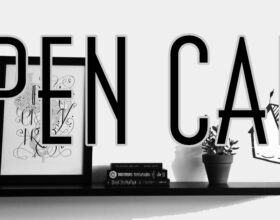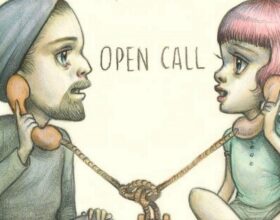 Welcome to the 11th edition of Open Call. This week we are talking about some of the ways community can help us in our own pursuits, and a few ideas we should look for (and do for others) in our communities to get the most out of it.
Welcome to the 11th edition of Open Call. This week we are talking about some of the ways community can help us in our own pursuits, and a few ideas we should look for (and do for others) in our communities to get the most out of it.
Email us at [email protected] with any questions you have, concerns, success stories, challenges, or any other topic you’d like to discuss with a Gallery Director. Every other Monday we’ll publish a few of our favorites along with my replies. If you don’t see your email published, it does not necessarily mean it won’t be saved for a future installment. There have already been way too many good questions to make it into just one edition. Visit my online author profile and stay updated on past editions. **Some emails have been edited for length.
Hey Patrick,
My name is Alex, I’m an artist from Seattle. I’ve been painting for a long time and have applied to a lot of galleries in the past and always get rejected. I have understood why with my older work but over the last couple years I have put a lot more time and effort into my paintings and have come up with a body of work that I and everyone that sees it feel is pretty unique and cohesive and I still get rejected from every gallery and contest. I know my work is good so I can’t really figure out why I can’t find a gallery that is interested in me or where my work fits. If you have any insight or suggestions I would greatly appreciate it. Thank you!
-Alex
Hi Alex,
Thanks for writing. First off, try not to be discouraged by your experience so far with galleries. If showing in a gallery is important to you and part of the plan you have for yourself you should keep trying to accomplish that goal, maybe just try to approach it differently. I know this stuff can be super frustrating at times, but the truth is not a whole lot of good comes out of banging our heads against a wall. There are a lot of things we do, and things we want to accomplish that depend on other people. Maybe parts of your plan depend on galleries responding positively to your work, directors and curators putting your stuff into shows, or depend on people purchasing your work, and things like that. And that’s all true, and it’s true for almost everybody not only artists – that a lot of the things we want both professionally and personally require that other people, if not entire communities choose to buy-in and support us or be a part of our lives and what we do. However, in trying to negotiate all of that one thing that has helped me a lot is to check myself from time to time and make sure that my plans and my efforts always stay in a place where I am able to feel as though I still have control, and have purchase it whatever is – or isn’t – going on. In other words, some of the most frustrating and head-slamming times can be the ones where you feel like you’re waiting or stuck, or even more so if you fall into believing that you’ve done everything that you can, but the other people or galleries that you need to move forward aren’t holding up their end of the bargain.
You can’t get the galleries to respond more positively to your work through will alone, unless you have some Professor X skills in which case Why Are You Writing Me Instead of Saving the World? – but you can change your approach. You can continue to develop your work. You can scrap your list of galleries who aren’t giving you the results you want and make a new and fresh one from scratch, and start again there.
Of course this doesn’t guarantee that you will get the results you want, but what it will do is make you more of a navigator and less a potential victim of circumstance. And in my experience, even when things don’t pan out this is a much better place to be.
It sounds like you already have some level of community support behind what you do, and that’s awesome. Although one other thing that I think is really important, especially within your core community, is to make sure that you aren’t assembling one that isn’t welcome to critical voices. I couldn’t say exactly why you aren’t getting anything from the galleries you are submitting to, but when you say that you ‘don’t get what the problem is because everyone says your work is great and cohesive, etc.’ – you may want to keep yourself distanced from what may be valuable and constructive feedback by putting yourself into a bubble.
There’s a book that I love and would recommend to anyone, especially people who work in any sort of creative space called, Creativity, INC. and it was written by Ed Catmull who, among many other things, is the president of Pixar. One of the things in his book that stuck with me the most is how Pixar developed a thing called the “Braintrust”. Essentially, it’s an ongoing series of collaborative discussions where with all sorts of check and balances, in terms of who participates. Many of those things are meant to bring new ideas and dissenting opinions so that what they do isn’t trapped inside an echo chamber where everyone believes that everything they’re doing is awesome and beyond reproach. It does away with some of the traditional hierarchy within the studio so that the work they do is always being truly critiqued, and in his opinion, this is crucial in making certain they do good work and never lose the idea that they can be better. I think this is an idea that all of us should keep in mind, especially when things aren’t going our way. Criticism is going to happen whether you like it or not. There’s a quote that I like from Kathleen Hanna that goes, “you’re still going to get criticized so you might as well do whatever the fuck you want”. This is a very good quote. I also think criticism is a tool we need to be our best, and that we should find a healthy balance between praise and constructive criticism. I think both are necessary to get what we want.
-patrick
*[note: Abbey – below – asked a whole bunch of questions and we slimmed it down to just a couple for this week. I’ll revisit some of the other one’s in the future.]
Hi Patrick!
My name is Abbey and I’m a Gallery Director [in Philadelphia]. I’ve been at [the gallery] since September 2013, and have been the Gallery Director for about a year and a half now. (I’m still learning… A LOT). I was originally the Assistant Gallery Director, and [the previous director] “groomed” me for this position knowing I would take over for him.
I want to be as helpful as I can as far as the gallery… however, these questions are not necessarily strictly gallery oriented, but can apply to the business as well.
How do we form a solid presence with the press?
How do we make solid connections with press outlets in (and outside) of Philadelphia?
We’ve shown artists from across the country and internationally as well. We hope to help our community by being an educational facility and also aspire to be a platform for artists/makers/craftspeople from the beginning to end… (learn, utilize our facilities, make, exhibit). We offer so many tools, equipment, storage, exhibition opportunities… things that not only young artists need, but even established artists might not have access to.
I feel as though I could ask you SO many more questions, but hopefully this is a good start as far as this offer by Beautiful Bizarre is concerned.
Thank you,
Abbey
Hey Abbey,
The bad news is that, at least in my own experience, there’s no magic bullet approach to getting your shows picked up by The Press. However, the thing that helps me the most in my own efforts to work with press and increase the visibility of what we do and what our artists do is to remember that, like many other things, press is all about relationships. Not like you should start spamming some writer at the Huffington Post with a plea to be best friends, because then they might think you are creepy AF and that could work against you, but a lot of the mechanics of relationship building are very important when you’re making these efforts. One easy example is, everyone knows someone or has someone in his or her life that is always asking for stuff and does not give anything in return.
Maybe they don’t even pretend to be interested in you or what you’re doing. This person is the worst! I think it’s important to at least try to make sure you are not being that person when you’re trying to get press. That’s not to say you need to wake up every morning and write every writer and say ‘good morning. How are you. No, like how ARE you, really?’ [again might be creepy] but maybe start out simply with at least an interest in what that writer or magazine or blog is trying to accomplish, who their audience is, and what their goals are. This isn’t something that you need them to take time to explain to you, a lot of the time you can get at least an idea of what these things are on your own, just by taking some time to read and learn. Once you have a better understanding of what their mission is, it becomes easier to understand how what you’re trying to accomplish can fit better into that, or maybe even help it. I think this approach is, at least, one that has a better rate of success.
Locally, especially here in Philly (where I live for those who don’t know), there are even more ways to go about building these relationships. Make sure you’re getting yourself out there and participating as an active part of what’s happening in the city. The outlets who you want to be covering your shows and artists are all over the city having their own events, sponsoring things, going to other art shows. You don’t need to hunt anyone down, by being an active part of the community I think in time you’ll see relationships and opportunities happen naturally. Some people I work with for press first came to us. Other’s I contacted to no avail for months and months until finally they were interested in a particular show or artist and then I had a better idea of what they’re looking for. Others I started working more closely with because I had a friend who works or worked their and asked for their help. Some I always see at other art shows. Others I’m on some committee with someplace. So it’s all sorts of different things, but at the end of the day it’s usually a little more than hitting send on a press release.
Again, there’s no guarantee and there are other factors. A lot of these people are overworked, and getting spammed a thousand times a day, and everyone is asking them for things, and asking them for time, and maybe they have their own personal mission that you don’t know about, or something like that. So there’s no “here’s one weird trick to get your art show covered by press”. I wish there was.
-patrick
[ Q from Facebook ]
Topic | street artist -Jean-Michel Basquiat any thoughts?
Elaine
– I heard that the apartment, or one of the apartments he lived in currently rents for $29,000/mo. That’s 29-Thousand. Per month. NYC is crazy.
– He’s an artist who I often hear people complaining about. I don’t really understand this. I don’t have a strong personal response to a lot of his work, but who cares? There’s this thing that you see a lot especially in more creative business like art and music, where if someone becomes really successful or well-known, people feel very compelled to invalidate them or the means by which they became well-known. To me that so many people care about art or an artist regardless of whether or not the reasons they care are ‘good’ reasons or ‘bad reasons’, is something that benefits all of us in the long run.
– In the biopic about Basquiat, Andy Warhol was played by David Bowie. There’s nothing I can say that hasn’t already been said this week, but Bowie was a truly remarkable and inspirational person for so many of us. One of my favorite things that I saw someone post went, “David Bowie is gone. Now it’s up to us to be extraordinary”.
RIP Goblin King.
Have a question for Patrick? Send inquiries to [email protected]
Patrick Shillenn is the co-founder and director of Arch Enemy Arts in Philadelphia. He doesn’t think he has all the answers. He just wants to have the conversation.
Follow him on IG @pshillenn & Twitter @mathclub





